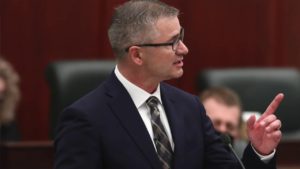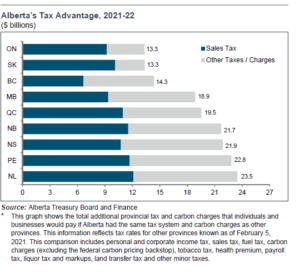Finance Minister Toews has learned from his grandmaster, Premier Jason Kenney, the dark art of scape-goating. Budget 2021 offers more of the same- restraint in public sector spending which is, in fairness, what they have promised. Except for the disastrous decline in resource revenue and increased health spending due to COVID, the government has retreated from its promise to balance the budget in its first term.

The scape-goats predictably are the federal government and the compensation levels for unionized public sector workers. The Alberta government continued to tilt at windmills like equalization payments and the federal government’s environmental assessment process. Over nearly 2 years of UCP rule, total debt has risen from $92.8 billion to $133.6 billion and is projected to reach $146 billion by March 2023 when Albertans will next elect another government. Under the NDP, total debt grew by $62 billion. Not much difference really between the tax and spend New Democrats and the fiscally prudent and market-based solutions United Conservative Party. Both inherited a bad situation and the UCP has faced very significant problems on the spending front, albeit abetted from the frequently maligned government in Ottawa (e.g. $1 billion for orphan wells among other things).

The attack on Ottawa consisted of the contradictory criticisms that the federal government was spending recklessly but not enough on Alberta. Second, Ottawa continues with its damaging policies towards to Alberta’s energy sector- a major driver in Canada’s current and future prosperity. Other familiar themes were the equalization program sending hundreds of billions to eastern provinces.
Mr. Speaker, the biggest obstacle to recovery may be our own national government, which has layered on regulatory requirements, created investment uncertainty, chased away the investment that maintains family-supporting jobs, and is now increasing the costs for our most vital national economic drivers.
Specific complaints included the parsimony displayed on changes to the fiscal stabilization program which “fall far short of fairness.” (And on this I frankly don’t understand why the federal government was slow to move on this and to be generous, in light of the money it has poured into the economy in the past 12 months.)
And yet:
Mr. Speaker, Alberta has contributed hundreds of billions of dollars to the federation in recent decades, and we cannot continue to see the same arrogance and unilateralism from the federal government as it develops plans to spend billions of taxpayer dollars on economic recovery.
Strong fighting words, a word choice that, doubtless, the Premier oversaw.
Mr. Toews then went on to address the second scape-goat in the context of “responsible spending.” Relying heavily on findings from the MacKinnon Panel, he reiterated the necessity to bring expenditures in line with other major provinces. Chief among the problems identified by MacKinnon and her fellow panelists was the salary structure of the public service. In spite of objective evidence showing Alberta’s revenue take from its economy is so much lower than other provinces, he rationalized salary cuts thus:
But simply put, we no longer have the revenue to justify higher comparative wages, especially at a time when many Albertans throughout the province have either experienced a wage reduction – or lost their job entirely.
This message plays particularly well to unemployed oil and construction workers and energy executives who have seen their jobs eliminated or bonuses and salaries cut.
Public sector wage cuts will naturally strain further, an already fraught relationship with Alberta’s largest labour unions. Guy Smith of AUPE has not eliminated the possibility of job action. Meanwhile, an estimated 300 public sector jobs will be eliminated while nearly 2,000 jobs are being in added in provincial agencies with nearly 3,000 new jobs at Alberta Health Services offset partly by 750 lost jobs in the post-secondary education sector (p. 182 of the Fiscal Plan). School job losses are estimated at zero but that is unlikely the view of most school board trustees and administrators. Meanwhile AIMCo is adding about 50 positions as it gears up to absorb the WCB and Alberta Teachers’ Retirement Fund asset management function.
Revenue Policy – Missing in Action
While the Minister rationalizes parsimony to its workers on the basis of insufficient revenues which (hopefully) will return with economic growth, the provincial Cabinet remain oblivious and steadfast in refusing to study its volatile revenue structure. In proclaiming no new tax or tax increases, his government’s prevarication on the revenue issue is truly breathtaking.
To those who would suggest we should simply raise taxes, I say no. Raising taxes at the best of times impedes economic growth, and with the challenges we face today, it would undermine the economic recovery that is so essential.
So, while a third-party review of the efficiency and appropriateness of our revenue structure will be important in the future, our immediate fiscal focus is on growing the economy and delivering government services most efficiently.

Thus Mr. Toews will join a long list of previous finance ministers who have kicked the debt/deficit can down the road while wishing for the return of the oil and gas fairy and robust economic growth to bail the province out again. Yesterday was a sad, sad day for the province’s taxpayers who will see the noose gradually tighten over diminishing options to address the totality of the province’s fiscal woes.
I do hope I am wrong, but I somehow think a sales tax is now a greater possibility than it has been since the Great Depression.

Related Posts